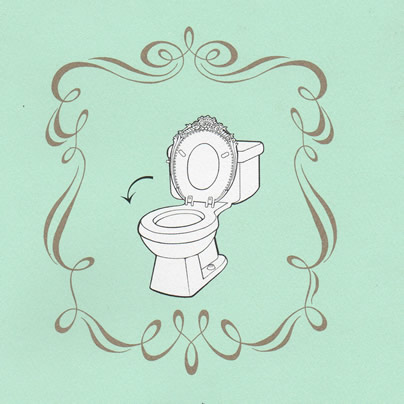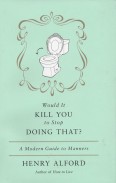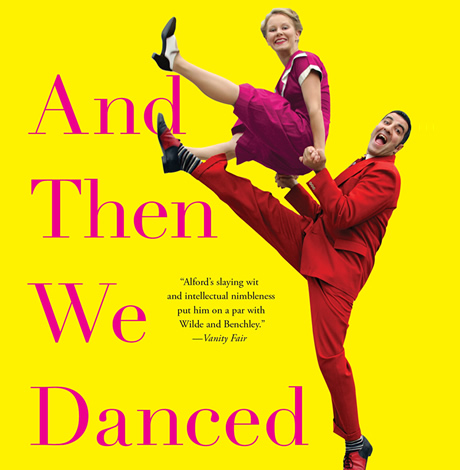Arts & Entertainment
Breach of manners
New book explores why some things drive us crazy

‘Would It Kill You to Stop Doing That? A Modern Guide to Manners’
By Henry Alford
Twelve
$24.99
243 pages
Stop it.
Just cut it out. Quit snuffling, chomping your gum and snapping your fingers in people’s faces. Don’t be rude and don’t do that thing with your foot, OK? Stop with those annoyingly intrusive questions, and by the way, no one appreciates your disgusting bodily noises.
Why is it that manners are something we possess but no one else does? Why do some things bother us, while others don’t? And, as author Henry Alford asks with his new book, “Would It Kill You to Stop Doing That?”
Why do we bother with manners? Henry Alford wondered that while he was in Tokyo. Japan, he says, is the “Fort Knox of the World Manners Reserve,” but we here in North America know a few things about that subject, too.
Scientists know, for instance, that we’re nicer to people we know. We define manners, not as protocol (a subset of mannerly behavior), but as sensitivity to others. Experts have hypothesized from where “Southern Charm” sprang. And when it comes to manners, we unequivocally say that we present good manners, while bad manners are what others have.
Of course, though, in our zeal to be polite, we do boneheaded things. We don’t think. We don’t listen. We say “no problem” instead of “thank you,” or we apologize insincerely or not at all. We bum-pat, hug (or are horrified by huggers), and we often eschew email etiquette.
So why are we this way? One of the reasons might be what doctors call “inattentional blindness,” which means that we’re too focused on other things, to the detriment of being nice. We might not be adept at small talk. We hide behind a group, an email alias or a Facebook page because we can.
There are things we can do about widespread rudeness, however. Summon your inner chat-ability at parties, but know that there are limits. Teach manners to your children. Pay attention to cultural differences. Cultivate the art of the smart (but ohhh-so-genteel) comeback.
“Would It Kill You to Stop Doing That?” is a quirky book. It’s not exactly an etiquette book, although there’s advice in here. It’s not a how-to, either, unless you do a lot of reading between the lines.
This book is more of a look at how we behave (or don’t) and why it bothers author Henry Alford — and that last part is what makes this book worth a read: Alford is pretty good at being Everyman. Like him, aren’t we all grossed-out by unflushed public toilets? Don’t we all hate drivers with perpetually turned-on turn signals? Haven’t we all committed a faux pas that made us want to slink away?
This book holds a mirror up to our foibles and though it, too, has its impolite moments, it’s also got some laughs. I think if you’re rubbed wrong by rudeness, you’ll like it but beware — start reading “Would It Kill You to Stop Doing That?” and you may not be able to stop.

Team DC, the umbrella organization for LGBTQ-friendly sports teams and leagues in the D.C. area, held its annual Night of Champions Awards Gala on Saturday, April 20 at the Hilton National Mall. The organization gave out scholarships to area LGBTQ student athletes as well as awards to the Different Drummers, Kelly Laczko of Duplex Diner, Stacy Smith of the Edmund Burke School, Bryan Frank of Triout, JC Adams of DCG Basketball and the DC Gay Flag Football League.
(Washington Blade photos by Michael Key)




















The 2024 National Cannabis Festival was held at the Fields at RFK Stadium on April 19-20.
(Washington Blade photos by Michael Key)
















Covering the @NatlCannaFest at RFK Stadium for @WashBlade . Stop by the LGBTQ+ booth and pick up a paper if you are here. pic.twitter.com/is7hnsaPns
— Michael Patrick Key (@MichaelKeyWB) April 20, 2024
Theater
‘Amm(i)gone’ explores family, queerness, and faith
A ‘fully autobiographical’ work from out artist Adil Mansoor

‘Amm(i)gone’
Thorough May 12
Woolly Mammoth Theatre
641 D St., N.W.
$60-$70
Woollymammoth.net
“Fully and utterly autobiographical.” That’s how Adil Mansoor describes “Amm(i)gone,” his one-man work currently playing at Woolly Mammoth Theatre.
Both created and performed by out artist Mansoor, it’s his story about inviting his Pakistani mother to translate Sophocles’s Greek tragedy “Antigone” into Urdu. Throughout the journey, there’s an exploration of family, queerness, and faith,as well as references to teachings from the Quran, and audio conversations with his Muslim mother.
Mansoor, 38, grew up in the suburbs of Chicago and is now based in Pittsburgh where he’s a busy theater maker. He’s also the founding member of Pittsburgh’s Hatch Arts Collective and the former artistic director of Dreams of Hope, an LGBTQ youth arts organization.
WASHINGTON BLADE: What spurred you to create “Amm(i)gone”?
ADIL MANSOOR: I was reading a translation of “Antigone” a few years back and found myself emotionally overwhelmed. A Theban princess buries her brother knowing it will cost her, her own life. It’s about a person for whom all aspirations are in the afterlife. And what does that do to the living when all of your hopes and dreams have to be reserved for the afterlife?
I found grant funding to pay my mom to do the translation. I wanted to engage in learning. I wanted to share theater but especially this ancient tragedy. My mother appreciated the characters were struggling between loving one another and their beliefs.
BLADE: Are you more director than actor?
MANSOOR: I’m primarily a director with an MFA in directing from Carnegie Mellon. I wrote, directed, and performed in this show, and had been working on it for four years. I’ve done different versions including Zoom. Woolly’s is a new production with the same team who’ve been involved since the beginning.
I love solo performance. I’ve produced and now teach solo performance and believe in its power. And I definitely lean toward “performance” and I haven’t “acted” since I was in college. I feel good on stage. I was a tour guide and do a lot of public speaking. I enjoy the attention.
BLADE: Describe your mom.
MANSOOR: My mom is a wonderfully devout Muslim, single mother, social worker who discovered my queerness on Google. And she prays for me.
She and I are similar, the way we look at things, the way we laugh. But different too. And those are among the questions I ask in this show. Our relationship is both beautiful and complicated.
BLADE: So, you weren’t exactly hiding your sexuality?
MANSOOR: In my mid-20s, I took time to talk with friends about our being queer with relation to our careers. My sexuality is essential to the work. As the artistic director at Dreams of Hope, part of the work was to model what it means to be public. If I’m in a room with queer and trans teenagers, part of what I’m doing is modeling queer adulthood. The way they see me in the world is part of what I’m putting out there. And I want that to be expansive and full.
So much of my work involves fundraising and being a face in schools. Being out is about making safe space for queer young folks.
BLADE: Have you encountered much Islamophobia?
MANSOOR: When 9/11 happened, I was a sophomore in high school, so yes. I faced a lot then and now. I’ve been egged on the street in the last four months. I see it in the classroom. It shows up in all sorts of ways.
BLADE: What prompted you to lead your creative life in Pittsburgh?
MANSOOR: I’ve been here for 14 years. I breathe with ease in Pittsburgh. The hills and the valleys and the rust of the city do something to me. It’s beautiful, it’ affordable, and there is support for local artists. There’s a lot of opportunity.
Still, the plan was to move to New York in September of 2020 but that was cancelled. Then the pandemic showed me that I could live in Pittsburgh and still have a nationally viable career.
BLADE: What are you trying to achieve with “Amm(i)gone”?
MANSOOR: What I’m sharing in the show is so very specific but I hear people from other backgrounds say I totally see my mom in that. My partner is Catholic and we share so much in relation to this.
I hope the work is embracing the fullness of queerness and how means so many things. And I hope the show makes audiences want to call their parents or squeeze their partners.
















